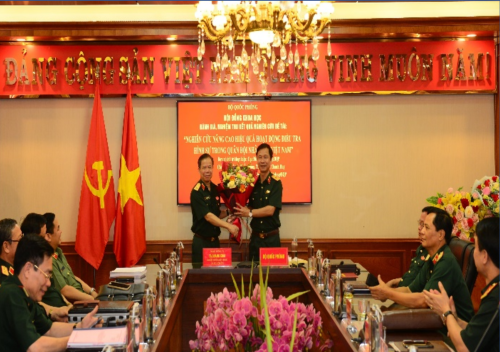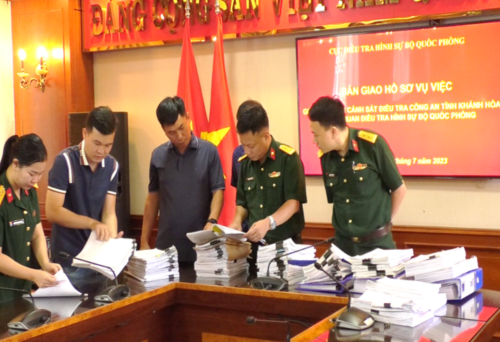Military Criminal Investigation Service enhances prevention and response to violation and crime in the new situation
To promote respect for law and compliance with discipline and order, contributing to building of an adept, compact, strong Military striving for modernity, the Military Criminal Investigation Service (MCIS) has been focused on leadership of doing all items of work, in which increased quality of prevention and response to violation and criminal crime pertaining to the military is recognised as a pivotal, decisive task.
Under the direct, comprehensive leadership and direction of the Central Military Commission (CMC) and Ministry of National Defence (MND), party committees and commanders at all echelons as well as cadres and soldiers of the MCIS are always fiercely loyal to the Fatherland, Party, State, and people; dedicated to the work; ready to sacrifice and overcome hardship; exercise solidarity, creativity, ingenuity, and flexibility in prevention and response to violation and crime; have a deep respect for law; and promote justice, observation of law, public-mindedness, and selflessness, thus creating overall power to complete all assigned tasks successfully. Specifically, the awareness and responsibility of cadres, party members, and soldiers for crime prevention and response are increasingly improved. The MCIS always has a deep understanding of violation and crime in order to timely advise the CMC, MND, party committees, and commanders at all echelons to adopt effective measures to combat violation and crime. They proactively discover, investigate, and deal with incidents and cases in accordance with laws without committing errors and omitting criminals; strictly enforce regulations on the management and imprisonment in support of investigation, indictment, judgement, and supervision of criminal judgement execution; well carry out criminal technical expertise to ensure objectiveness, accuracy, and timeliness, making vital contribution to strengthening of law, order, and discipline and increased combat power of the military.
 |
| Successfully protecting the project "Enhancing the operation of the Military Criminal Investigation Service |
Despite many important achievements, as a result of various factors, violation and crime relating to the military are likely to witness complex developments with the emergence of many new crimes, especially those concerning drugs, high technology, irresponsibility causing serious damage, etc., which may undermine prestige and image of the military. The circumstance is placing increasingly high requirements for professional skills, demanding that the MCIS bring into play their achievements to promote solidarity and enhance quality of preventing and combating legal violation and crime relating to the Military, most notably the following solutions.
First, increased competence and effectiveness of controlling behaviours in violation of criminal law; recommendation, investigation, and strict punishment of violation and crime relating to the military. This is the most important solution which aims to timely detect, prevent, and minimise law violation and crime, especially the criminal crimes relating to the Military; deal with wrongdoings effectively and in accordance with law, contributing to strict maintenance of Military discipline and State law. Accordingly, the criminal investigation agencies at all echelons must strictly implement regulations on criminal duty and business duty to have a thorough understanding of situations, especially those in grassroots units, thereby documenting and controlling violation and crime closely; correctly analyse and assess causes and conditions for emerging violation and crime; accurately predict violation and crime relating to the Military without responding to incidents passively. There is a need to resolutely deal with concealment of incidents, late report, and incorrect report, making it hard for investigation and punishment. The criminal investigation agencies must advise party committees and commanders of departments and units on effective preventive measures to minimise violation and crime relating to the military.
Regarding investigation and punishment of violation and crime relating to the military, the criminal investigation agencies at all echelons must successfully cooperate with relevant bodies in the civilian and military sectors, especially the corresponding procuracies, in successful deal with offense denunciation, information about offense, and criminal case initiation proposal; focus on promoting the effectiveness of criminal technical expertise, investigation, and verification of cases and incidents to ensure objectiveness, accuracy, and timeliness, thus contributing to enhanced prestige and quality of criminal technical expertise of procuracies in civilian and military sectors. Cases whose investigation is closed and are proposed to prosecute must be carried out closely with the right persons and offenses without omitting criminals and minimising the return of case files for further investigation. The criminal investigation agencies at all echelons must promote law observation during investigation and punishment of criminals to ensure serious implementation and abstention from corporal punishment, erroneous, or violation of professional ethics.
Second, making the corps of investigators on a par with requirements of procedural activities. Investigators’ activities are the ones which initiate a legal process and play an extremely important role in the settlement of cases. Investigative findings are the most important foundations for dealing with cases in the following proceedings. Therefore, party committees and commanders at all echelons must put effort into leading and directing the development of investigators who have comprehensive competence, a thorough understanding of legal knowledge and skills, political steadfastness, good ethics, and ability to coordinate and practise professional work. First of all, there is a need to concentrate on improving professional ethics. Each investigator must have a kind heart, a fine mind, and ability to withstand offenders’ bribery, inducement, and threat, including those in high positions and social standing. During task performance, investigators must respect law and morality; have a love of people and comrades, respect and protect honour, dignity, and legitimate interests of citizens and military personnel; have no desire for individual interests; dare to take responsibility for their decisions; resolve to attack crimes repeatedly and intolerantly.
 |
| Receiving crimincal cases handed over by the police |
To establish a corps of investigators with good ethics and talent, party committees and commanders at all echelons must attach importance to education and training, which aims to provide investigators with comprehensive knowledge of economics, politics, culture, society, science and technology, foreign languages, and law, thereby enabling them to conduct scientific research and propose major guidelines on improvement of law and policies on the coordination and implementation of investigation activities. Further attention should be paid to training, retraining, joint training, and cultivation of cadres with judicial titles; increased quality of examinations for recruiting investigators to the Military; give training courses in investigative skills. It is necessary to successfully hold the Good Commander of Regional Criminal Investigation Departments prior to the Good Commander of Criminal Investigation Departments at the military region level and the equivalent. Moreover, special importance is attached to building of the coming corps of assessors capable of fulfilling missions, especially those in newly approved majors such as acoustic assessment, fire and explosion assessment, digital and electronic assessment, and so forth.
Third, enhanced professional inspection, preliminary review, summing-up, and training. To further promote quality of preventing and combating violation and crime relating to the Military, the Criminal Investigation Directorate (CID) and criminal investigation bodies at all echelons must step up giving instructions and appraising procedural documents of the lower echelons; monitor and firmly grasp evolution of violation and crime, progress and outcome of dealing with information sources and crime investigation, and results of applying deterrent measures and criminal pursuit; raise quality of professional inspection work, ensuring substance and effectiveness, thereby timely detecting and addressing shortcomings and limitations of the subordinate criminal investigation agencies; combine planned, periodic, unplanned, and themed inspections.
In addition to good delivery of expertise examination, the CID, departments, and units need to attach importance to preliminary review and summing-up, thus evaluating causes of advantages and disadvantages, timely drawing lessons learnt, and propose responses in the time to come. Furthermore, they are to successfully carry out training work to improve knowledge, skills, experience, and ability to apply legal regulations on handling offense denunciation and information about offense, criminal case initiation proposal, criminal investigation and combat, etc., of the commanders and deputy commanders of investigation bodies, investigators, and bodies in charge of some investigation activities. Of note, there is a need to improve investigators’ skills to participate in courts, experience in some investigation activities, some content enshrined newly issued legal normative documents concerning the prevention and response to violation and criminal offense.
Fourth, effective investment and use of technical equipment and vehicles for crime prevention and combat. In the context of increasingly complex developments of crimes, especially the high-tech ones, the entire MCIS must attach importance to effective investment and use of technical equipment and vehicles in order to meet requirements of crime prevention and combat in the new period. On the basis of existing equipment and vehicles, it is necessary to increase investment in professional departments of the CID to enable them to provide professional instruction for the subordinate criminal investigation bodies; upgrade electronic device and software which have been invested in accordance with technological development; enhance quality of professional equipment and vehicles; timely procure AI-enabled tools to support assessment; and invest in facilities and equipment of the MND’s Criminal Technical Assessment Agency, ensuring synchronicity and contributing to accomplishment of assigned tasks. The CID and criminal investigation bodies at all echelon must also step up applying information technology to do their jobs in an accurate, timely, effective manner; establish the architecture framework of the second-generation MND Electronic Government and accelerate digital transformation in the MCIS according to the plan of the MND.
Major General NGUYEN THANH HUY, Director General, Criminal Investigation Directorate